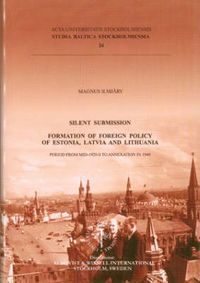
Silent submission : formation of foreign policy in Estonia, Latvia and Lith
Until the present time the foreign policy of the Baltic states between-the-wars period has not been sufficiently researched. This work attempts to determine among other issues the nature of relations between the Estonian, Latvian and Lithuanian presidents - Konstantin Pats, Karlis Ulmanis and Antanas Smetona respectively - and the Soviet Union. Specifically it also tries to provide answers to the following questions: first, what prevented the Baltic states from cooperating politically and militarily; second, what kind of relations existed between the Baltic states and the Great Powers - Great Britain, Germany, the Soviet Union and Poland; third, what was implied by the policy of neutrality, declared in the second half of 1930-s. The author attempts to answer the question why in the fall of 1939 the Baltic states were not able to collaborate politically and militarily, and why, unlike Finland, Estonia, Latvia and Lithuania chose the path of unconditional surrender.
Utgiven: 2004
ISBN: 9789122020868
Förlag: Almqvist & Wiksell Internation
Format: Häftad
Språk: Engelska
Sidor: 592 st
Until the present time the foreign policy of the Baltic states between-the-wars period has not been sufficiently researched. This work attempts to determine among other issues the nature of relations between the Estonian, Latvian and Lithuanian presidents - Konstantin Pats, Karlis Ulmanis and Antanas Smetona respectively - and the Soviet Union. Specifically it also tries to provide answers to the following questions: first, what prevented the Baltic states from cooperating politically and militarily; second, what kind of relations existed between the Baltic states and the Great Powers - Great Britain, Germany, the Soviet Union and Poland; third, what was implied by the policy of neutrality, declared in the second half of 1930-s. The author attempts to answer the question why in the fall of 1939 the Baltic states were not able to collaborate politically and militarily, and why, unlike Finland, Estonia, Latvia and Lithuania chose the path of unconditional surrender.
Begagnad bok (0 st)
Varje vecka tillkommer tusentals nya säljare. Bevaka boken så får du meddelande när den finns tillgänglig igen.



